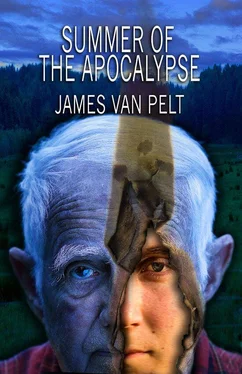James Van Pelt
SUMMER OF THE APOCALYPSE
Eric wished he could enjoy the warm August sun that penetrated deep into his old muscles, but he could hear Dodge and Rabbit talking in front of his house, and he knew the two children came to hear about the Gone Times. Almost no one else visited—they didn’t care to listen to his stories—but the children liked to talk about the old days, and their company was appreciated. Lately he’d been restive. He enjoyed sunsets less. He took longer and longer walks, always toward the foothills, sometimes getting home after nightfall. People in the village didn’t do this. Fear of wild animals kept them indoors after dark, but Eric couldn’t shake the habit and the notion that the night was safe for man. He felt the urge to travel again, to see new places one more time before illness, or just plain age, forced him to stay home. This afternoon, though, stretched out on a hammock, with the late spring sun so pleasant, a breeze blowing cool off the mountains and a glass of pungent herb tea beside him, he’d rather drift into a doze.
“Are you sleeping, Grandfather?” Dodge, a tall, skinny ten-year-old with dark hair neatly cut into bangs above his eyebrows, pushed the creaky gate open. Rabbit, his sullen twelve-year-old friend, whose face bore heavy scars from wild dog bites suffered when he was five, followed.
“Why bother an old man?” said Eric. He pointed at the pitcher and the boys poured themselves tea.
“Don’t you have productive things to do? Maybe you could pull weeds for me.” Dodge emptied his drink with one gulp. Rabbit retreated to the shade of the grape vines and sat cross-legged on the grass. His broad shoulders and thick chest hinted at the bulk of the man he might become. “You tell him,” said Rabbit.
“What?” Eric swung his feet off the hammock and sat up. His back twinged and he grimaced. Beyond the fence that encircled his vegetable garden, the dusty road was empty all the way to the cottonwoods that lined the river. Most people napped during the heat. Later, when the sun moved closer to the mountains, horse drawn carts would pass occasionally, but generally life in Littleton was slow in August. People tended their gardens. Field workers walked past his house at dusk. Some would wave, but most ignored him. He was just a crotchety old man who not only wouldn’t let go of the Gone Times, but who also upset the town meetings with his criticisms.
“What news do you have?” Eric asked.
Dodge said, “Dad wants to see you. Don’t tell him I come out here all the time, okay? Dad says, ‘Family gatherings are bad enough. I don’t need you coming home with his garbage.’ But I think he’s stupid.” Eric sighed. This was a common gambit of Dodge’s, to not answer questions. It was a family trait. “Your father isn’t stupid. When you’re thirty, you’ll wish you listened to him more now.” Dodge looked longingly at the pitcher. Eric nodded and the boy filled his glass again. “You don’t have a dad to make you do chores or go to school. ‘Look for cloth today, Dodge,’ he says, or ‘Find some tools for trade.’ You’d think that he doesn’t want me to have any fun. Besides, there isn’t anything to find here anymore. All the easy pickings are gone. Not like when you were a kid. We brought something for you, though.” Dodge dug into his backpack and removed a thick book. He handed it to Eric. “I know you don’t have this one.”
Eric turned the volume over. It was an anthology called Major American Authors. He opened the cover. The pages were slightly wrinkled, as if the book had been exposed to moist air at one time, but other than that, it seemed in good shape. He read the ending lines of a quote from Nathaniel Ames’ Almanac, 1758. O ye unborn inhabitants of America! Should this page escape its destined conflagration at the year’s end, and these alphabetical letters remain legible when your eyes behold the sun after he has rolled the seasons round for two or three centuries more, you will know that in Anno Domini, 1758, we dreamed of your times.
I doubt it, Eric thought.
He frowned. “You shouldn’t be scavenging. That’s work for men who know what they’re doing.” Dodge said, “We can get places they can’t. They’re too big. Rabbit found the case of knives last year. The glass wasn’t even broken on the front. We don’t touch anything we’re not supposed to, We’re not kids, you know.”
The case of knives had been big news the summer before. Eric lifted it as part of an argument to the city council. “When was the lust time someone got good stuff?”
“What do you think, Rabbit?” said Dodge. Rabbit looked into his tea. His hair hung over his eyes. The scars puckered the right side of his face, and he seldom met Eric’s gaze even though he’d been coming to his house for years.
Rabbit tilted his head back and stared into the vines. Eric noticed he kept the good side of his face turned toward them. He said, “The knives, I guess. Camaro’s Mom found some canned goods last week, but they were all bad. No labels and swelled up. Doc Renke says we shouldn’t eat anything from cans anyway, swelled or not.”
Eric laughed silently at the mention of “Camaro.” Lots of children born in the last twenty years or so had been named after automobiles. There was Dodge, of course, and Rabbit, but he also knew a red-headed girl named “Blazer,” a pair of twins, “Plymouth” and “Neon,” and the miller’s son, “Mercedes.” None of these children had ever seen a working automobile. The last one Eric remembered was a Volkswagon Bug that drove by his house twenty-five years ago. That was when the Bowles Avenue bridge repair still stood. The cars were gone, but the names lived on.
“We’ve been hunting for treasure troves,” Dodge said to Eric. “There are basements with guns and knives and tools on the other side of the river, if you know where to look.” Rabbit laughed derisively. “That’s a lot of bunk.” He pushed the hair off his forehead. “If you believe that, then you must think we’ll find good ’lectronics or a car that’ll start.” Dodge smiled. “Who knows what’s on the other side of the river? Dad told me just yesterday that lots of stuff must still be out there. But hunting around here is a waste. Just a chore.”
“You boys been crossing?”
They looked at each other guiltily. Finally Dodge said, “We know a shallow place we can walk through. But we’re real careful and we watch out for each other all the time. You won’t say anything will you?” Eric leaned back in his hammock. He guessed that it had been eight or nine years since he had crossed the river. A rumor that an undiscovered sporting goods warehouse existed in the ruins of downtown Denver drew him and four others, but after a week of poking though rubble and climbing down into treacherous mazes of steel, brick, rotten wood and sheetrock, they’d given up. All of the street signs were gone, many of the streets impassable, and the fifty-year-old map they were using had gotten wet early in the trip and was unreadable. A skunk bit Herbie when he reached blindly into its den, and rabies killed him by the end of the summer. All in all, it had been a useless effort. Still, he remembered when Denver was a treasure trove, when he could walk onto any car lot, break into the office to find keys, and drive away with anything he wanted.
He looked the boys over carefully. The book rested heavily in his hands. “I’ll tell you what. I won’t talk about your expeditions, and maybe next time you head out you could show me where you got this.” Both boys shook their heads. “No way, Grandfather,” said Dodge. “Dad would whip my butt for sure.”
Читать дальше












